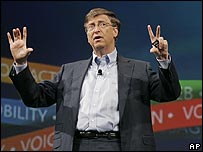The 10 Part Framework to Deliver a Presentation like Steve Jobs
January 27, 2024
Our communications coach breaks down the ace presenter’s latest Macworld keynote. The result? A 10-part framework you can use to wow your own audience

When Apple (AAPL) CEO Steve Jobs kicked off this year’s Macworld Conference & Expo, he once again raised the bar on presentation skills. While most presenters simply convey information, Jobs also inspires. He sells the steak and the sizzle at the same time, as one reader commented a few years ago.
I analyzed his latest presentation and extracted the 10 elements that you can combine to dazzle your own audience. Bear in mind that Jobs has been refining his skills for years. I broke down his 2007 Macworld keynote in a previous column (BusinessWeek.com, 7/6/07) and in a chapter in my latest book. Still, how he actually arrives at what appear to be effortless presentations bears expanding on and explaining again.
1. Set the theme. “There is something in the air today.” With those words, Jobs opened Macworld. By doing so, he set the theme for his presentation (BusinessWeek.com, 1/15/08) and hinted at the key product announcement—the ultrathin MacBook Air laptop. Every presentation needs a theme, but you don’t have to deliver it at the start. Last year, Jobs delivered the theme about 20 minutes into his presentation: “Today Apple reinvents the phone.” Once you identify your theme, make sure you deliver it several times throughout your presentation.
2. Demonstrate enthusiasm. Jobs shows his passion for computer design. During his presentation he used words like “extraordinary,” “amazing,” and “cool.” When demonstrating a new location feature for the iPhone, Jobs said, “It works pretty doggone well.” Most speakers have room to add some flair to their presentations. Remember, your audience wants to be wowed, not put to sleep. Next time you’re crafting or delivering a presentation, think about injecting your own personality into it. If you think a particular feature of your product is “awesome,” say it. Most speakers get into presentation mode and feel as though they have to strip the talk of any fun. If you are not enthusiastic about your own products or services, how do you expect your audience to be?
3. Provide an outline. Jobs outlined the presentation by saying, “There are four things I want to talk about today. So let’s get started…” Jobs followed his outline by verbally opening and closing each of the four sections and making clear transitions in between. For example, after revealing several new iPhone features, he said, “The iPhone is not standing still. We keep making it better and better and better. That was the second thing I wanted to talk about today. No. 3 is about iTunes.” Make lists and provide your audience with guideposts along the way.
4. Make numbers meaningful. When Jobs announced that Apple had sold 4 million iPhones to date, he didn’t simply leave the number out of context. Instead, he put it in perspective by adding, “That’s 20,000 iPhones every day, on average.” Jobs went on to say, “What does that mean to the overall market?” Jobs detailed the breakdown of the U.S smartphone market and Apple’s share of it to demonstrate just how impressive the number actually is. Jobs also pointed out that Apple’s market share equals the share of its top three competitors combined. Numbers don’t mean much unless they are placed in context. Connect the dots for your listeners.
5. Try for an unforgettable moment. This is the moment in your presentation Read more
The New Blind Spot of Business
January 16, 2024
You’re driving along, and you decide to change lanes. You check your rear view mirrors; a quick sideways glance; and activate your turn signal. Suddenly a horn blares and a fender flashes in your peripheral vision. You react, but were you fast enough to avoid the imminent collision? A car was in your blind spot. What does this have to do with global business? Everything. There is a “new blind spot” going unnoticed.
We are certainly in the most complex business era ever. Complexity grows daily. The range of issues management must consider is staggering—terrorist threats, foreign exchange, off-shoring, financing debacles, illegal immigration, new regulations, energy/commodity shortages, and technology that’s growing at warp speed.
A New Layer of Complexity—The “Blind Spot”
As if this array of issues isn’t enough, there’s another layer of complexity, a new “blind spot” if you will, just waiting to cause problems. What is it? The layer of complexity caused by the desperate pursuit of double-digit growth in low (or no) growth markets. Emerging mega-customers command huge buying leverage, as competitors fight for growth around the globe. Just as a well-intentioned lane change exposed the danger in your blind spot, this relentless search for growth causes a new blind spot—complexity caused by proliferation, done with the well-intentioned quest for growth where there is little, or none, to be had.
This new blind spot exists because of two factors, which together cause tectonic shifts in global competition.
Read more
Leadership’s Changing of the Guard
January 15, 2024
 by Dr. John C. Maxwell
by Dr. John C. Maxwell
Silently, under our noses, a changing of the guard is going undetected. As the Baby Boomer generation retires from positions of leadership, another generation is just beginning to cut its teeth in management. This new generation, The Millennials, brings with them a different set of attitudes and expectations than their predecessors. While most literature has focused on how to manage Millennials, author Jim Heskett poses a question one step down the road in his article, “How Will Millennials Manage?” His commentary, featured on Harvard Business School’s Working Knowledge web forum, opens debate on leadership’s newest debutants—those born from the late ‘70s until the year 2000.
Like any generation, the persona of Millennials has been shaped by the societal forces of their formative years. Heskett mentions a few of these in his article, namely the Internet and a robust economy. As the first generation to spend a significant part of childhood with cell phones and email, Millennials are a connected crew. Most of them would prefer to part with their television before their computer. They are used to having access to friends and information in a flash. As the wealthiest generation of all time, they have an entitlement attitude unlike any prior generation. Most did not grow up doing hours of chores on the family farm or being forced to work after school to make ends meet. Rather, affluent Millennials were handed an allowance for nothing more than staying out of trouble.
Read more
Bill Gates: The Skills You Need to Succeed
December 15, 2023
One of the most important changes of the last 30 years is that digital technology has transformed almost everyone into an information worker.

In almost every job now, people use software and work with information to enable their organization to operate more effectively.
That’s true for everyone from the retail store worker who uses a handheld scanner to track inventory to the chief executive who uses business intelligence software to analyse critical market trends.
So if you look at how progress is made and where competitive advantage is created, there’s no doubt that the ability to use software tools effectively is critical to succeeding in today’s global knowledge economy.
A solid working knowledge of productivity software and other IT tools has become a basic foundation for success in virtually any career.
Beyond that, however, I don’t think you can overemphasise the importance of having a good background in maths and science.
If you look at the most interesting things that have emerged in the last decade - whether it is cool things like portable music devices and video games or more practical things like smart phones and medical technology - they all come from the realm of science and engineering.
The power of software
Today and in the future, many of the jobs with the greatest impact will be related to software, whether it is developing software working for a company like Microsoft or helping other organisations use information technology tools to be successful.
Communication skills and the ability to work well with different types of people are very important too.
A lot of people assume that creating software is purely a solitary activity where you sit in an office with the door closed all day and write lots of code.
This isn’t true at all.
Software innovation, like almost every other kind of innovation, requires the ability to collaborate and share ideas with other people, and to sit down and talk with customers and get their feedback and understand their needs.
I also place a high value on having a passion for ongoing learning. When I was pretty young, I picked up the habit of reading lots of books.
It’s great to read widely about a broad range of subjects. Of course today, it’s far easier to go online and find information about any topic that interests you.
Having that kind of curiosity about the world helps anyone succeed, no matter what kind of work they decide to pursue.
Bill Gates is chairman, chief software architect and one of the founders of Microsoft, the world’s largest software company. From July 2008 he will end his day-to-day involvement in the company and focus on the Bill and Melinda Gates Foundation and its global health and education work.















